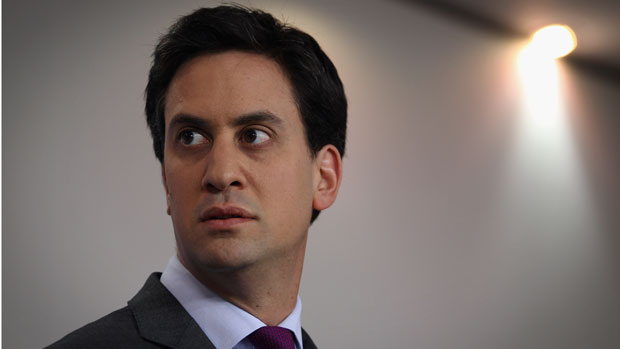Is Ed Miliband a 'nebbish'? Or will he have the last laugh?
Ed is nowhere near as unpopular as Gordon Brown – and Cameron was unable to knock him out

A free daily email with the biggest news stories of the day – and the best features from TheWeek.com
You are now subscribed
Your newsletter sign-up was successful
LABOUR has crept ahead a little in the latest YouGov poll for The Sunday Times – they're three points up on the Tories (Lab 37, Cons 34, Ukip 13 and Lib Dems 9) compared with only one point last Tuesday.
But it's nowhere near the six or seven-point leads registered at the start of the year and the anti-Miliband noise is growing louder.
"Sooner or later the Tories were always going to get their act together," Labour's Rochdale MP Simon Danczuk said at the weekend. "Now we need to up our game".
The Week
Escape your echo chamber. Get the facts behind the news, plus analysis from multiple perspectives.

Sign up for The Week's Free Newsletters
From our morning news briefing to a weekly Good News Newsletter, get the best of The Week delivered directly to your inbox.
From our morning news briefing to a weekly Good News Newsletter, get the best of The Week delivered directly to your inbox.
Writing for the Mail on Sunday, Danczuk said it was no good "continually reciting a mantra of misery" and warned that the party would not win the 2015 general election by relying on a "core vote and a few disgruntled Liberals".
The Sunday Times, meanwhile, quoted the Labour candidate in Chatham and Aylesford, a Tory-held marginal, attacking Team Miliband for running a "dodgy campaign".
Tristan Osborne, who, the paper informed us, was tricked into talking to a man posing as a PR professional, said: “We need to be appealing to the aspirational southern voter... the current strategy doesn’t seem to indicate that we are winning over that type of support, and that is the issue... the machine is not functioning in any capacity.”
These negative comments follow last week's news that Miliband's personal rating had fallen to minus 25 according to an ICM poll (only 26 per cent were satisfied against 51 per cent dissatisfied).
A free daily email with the biggest news stories of the day – and the best features from TheWeek.com
A measure of the growing anxiety over Labour's chances of winning the general election is that when the American political strategist David Axelrod flew into London last week for his meeting with Team Miliband, I understand a member of the Labour leader's staff asked about the importance of "the personal factor".
Axelrod had to admit that the personal quality of the candidate – as opposed to the strength of the party's policies - does matter. He recalled that alongside his successes with Clinton and Obama he had been part of John Edwards's doomed run for the presidency in 2004. (As Axelrod commented at the time: “At some point the candidate has to close the deal and - I can’t tell you why - that never happened with John.")
Meanwhile, Tory commentators also have their tail feathers up. The Daily Telegraph's Ben Brogan says he has his money on Cameron remaining in Number Ten, even if Labour are slightly ahead in the polls. While Paul Goodman, the former Tory MP who now edits ConservativeHome, has come up with a new insult for the Labour leader - he is a “nebbish”.
"Miliband has his strengths," writes Goodman. "He isn’t bad in the Commons. And he has sometimes turned the tactical tables on David Cameron – over Syria and press regulation, say. But … let’s face it – the voters see him as a nebbish.”
This is a Jewish insult - like Miliband and Axelrod, Goodman was born into a Jewish family although he later converted to Catholicism - which translates variously as "timid", "ineffectual", "bumbling" even "nerdish", depending on which dictionary of slang you choose.
But are the critics right to pin so much hope on Ed's personal weaknesses as a candidate?
As we are so often reminded, Margaret Thatcher was miles behind James Callaghan in the popularity stakes when she led the Tories to victory over Labour in May 1979. But does more recent satisfaction polling perhaps provide an even better forecast?
After Gordon Brown ducked the chance to call a snap election in 2007, his premiership is generally agreed to have been a political fiasco, an election disaster waiting to happen. He was, indeed, defeated in 2010 - yet we tend to forget he did well enough to hang on and seek a deal with the Lib Dems that would have kept Labour – but not Brown – in power.
So how do the ratings of Brown, Cameron and Clegg in May 2009, a year away before the 2010 election, compare with the relative standings of Cameron, Miliband and Clegg today?
An Ipsos Mori poll conducted in May 2009 asked people how they thought Brown was doing as Prime Minister. A whopping 69 per cent were dissatisfied with just 26 per cent approving, a net score of minus 43.
David Cameron, then Leader of the Opposition, had a net satisfaction score of plus 16 (51 per cent satisfied, 35 per cent dissastisfied). Nick Clegg fared even better with a plus score of 22 (45 per cent satisfied, 23 per cent unimpressed).
Other pollsters had even worse scores for Brown with YouGov showing him disapproved of by 78 per cent to 17 per cent, a net score of a stunning minus 61.
Yet, 11 months later David Cameron failed to deliver a knockout blow to this battered figure.
Fast forward to this month and a new Ipsos Mori poll showed 39 per cent satisfied with Cameron's performance as PM as against 52 per cent dissatisfied, a net score of minus 13. Miliband is on minus 23 (31-54) and Clegg is on minus 43 (23-66).
So, Miliband is nowhere near being in the doldrums Gordon Brown found himself in – and he is pushing policies that are generally proving popular with voters, even if they are rubbished by right-wing commentators.
And it's these policies – the latest being a minimum wage linked to average hourly pay - that David Axelrod believes can make Miliband a winner.
At last week's meeting, he is said to have reiterated what he said about Miliband when his appointment was announced a month ago: "He understands that a growing economy demands that you have to have broad prosperity. We can’t just have prosperity hoarded by a few where people at the top are getting wealthier and wealthier but people in the middle are getting squeezed.
“That is how we won in the US. Barack Obama articulated a vision which had, at its core, the experience of everyday people. And everyday people responded, they organised and they overcame the odds. I see the same thing happening in Britain.”
We'll see.
-
 Political cartoons for February 21
Political cartoons for February 21Cartoons Saturday’s political cartoons include consequences, secrets, and more
-
 Crisis in Cuba: a ‘golden opportunity’ for Washington?
Crisis in Cuba: a ‘golden opportunity’ for Washington?Talking Point The Trump administration is applying the pressure, and with Latin America swinging to the right, Havana is becoming more ‘politically isolated’
-
 5 thoroughly redacted cartoons about Pam Bondi protecting predators
5 thoroughly redacted cartoons about Pam Bondi protecting predatorsCartoons Artists take on the real victim, types of protection, and more
-
 How corrupt is the UK?
How corrupt is the UK?The Explainer Decline in standards ‘risks becoming a defining feature of our political culture’ as Britain falls to lowest ever score on global index
-
 How long can Keir Starmer last as Labour leader?
How long can Keir Starmer last as Labour leader?Today's Big Question Pathway to a coup ‘still unclear’ even as potential challengers begin manoeuvring into position
-
 The high street: Britain’s next political battleground?
The high street: Britain’s next political battleground?In the Spotlight Mass closure of shops and influx of organised crime are fuelling voter anger, and offer an opening for Reform UK
-
 What is the Donroe Doctrine?
What is the Donroe Doctrine?The Explainer Donald Trump has taken a 19th century US foreign policy and turbocharged it
-
 Is a Reform-Tory pact becoming more likely?
Is a Reform-Tory pact becoming more likely?Today’s Big Question Nigel Farage’s party is ahead in the polls but still falls well short of a Commons majority, while Conservatives are still losing MPs to Reform
-
 ‘This estrangement from death has beget euphemisms’
‘This estrangement from death has beget euphemisms’Instant Opinion Opinion, comment and editorials of the day
-
 Taking the low road: why the SNP is still standing strong
Taking the low road: why the SNP is still standing strongTalking Point Party is on track for a fifth consecutive victory in May’s Holyrood election, despite controversies and plummeting support
-
 Will Trump actually prosecute Obama for 'treason'?
Will Trump actually prosecute Obama for 'treason'?Today's Big Question Or is this just a distraction from the Jeffrey Epstein scandal?